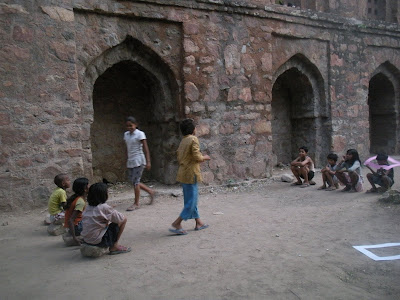



After getting a tour of their immediate neighborhood, we asked the children most of whom lived in Panchsheel Vihar and played at the DDA park if any of them ever used the ‘Quila’ and its compound for play. Most of the children (even the boys) said that they aren’t allowed to go there by their parents because it is considered unsafe. Two of them, however, Radha and Sultana, said that they like to go there. Interestingly, both of these 9 year old girls had short hair, and dressed and behaved like boys. Both were extremely active, always dressed in shorts and constantly running or climbing things. We asked them to show us where in the ‘Quila’ they play. The daredevils entered the compound (which had many older adolescent boys in it) without batting an eyelid, while the rest of the group hesitated just outside. Their preferred place was on one side away from the where the older boys stood. It contained a large pile of rocks, some overgrown grass on the side with bits of rubbish lying around.


Gol-Chakkar
We asked the children to play any of their favorite games. Within 10 seconds, they were all busy heaving huge rocks to a clearing, and arranging them in the circle. We were amazed at how quickly and spontaneously they had assessed their environment and made use of it to make a variation of a game they played. When they had arranged the stones, they stood on top of them, held hands and skipped from one stone to the next. Whoever stepped on the ground was ‘out’ and the last one standing was the winner. They called this game “Gol Chakkar” or “Roundabout”.



Son-Pari
When this game got over, they shifted to another one which they called ‘Son-Pari’. Rinki and Gudiya became leaders of opposing teams and then they rearranged the same stones into two lines, some distance apart. The team members sat on them facing each other. This game was particularly fascinating, as it seemed like a complex mixture of chess and ‘guess-who’; utilizing team-work, long-jump skills, and verbal creativity. The leader would close the eyes of one member of the other team and using creative variations of the ‘son-pari’ rhyme, call on one of her team members to touch the blindfolded member. If the person who was blindfolded guessed the name of the persona who touched her/him right, then she could make a one step jump and move closer to the other team.
A couple of children who did come to play here before had only played cricket, the sacred sport of this zone. On receiving encouragement from two friendly adults who watched over them and ensured they could not be chased away from this space by older boys and who cheered them as they played traditional games which were mostly played on the terraces and streets of Panchsheel Vihar, the children allowed themselves to create new games and engaged in free play in a space that has never before afforded that. This experience, for me, underlines the importance of play stewards in contested community open spaces in promoting free play and nurturing creativity in children.
No comments:
Post a Comment